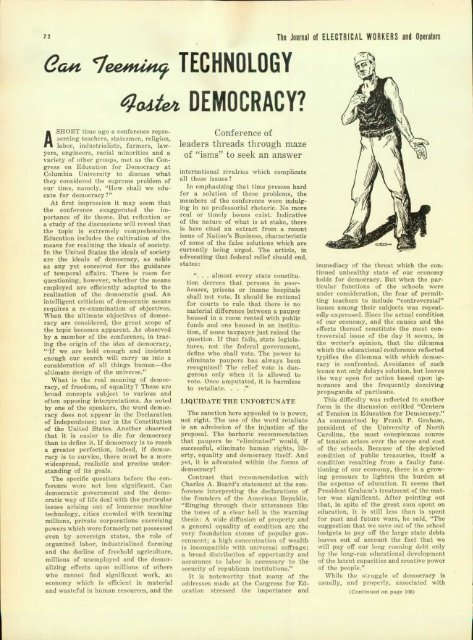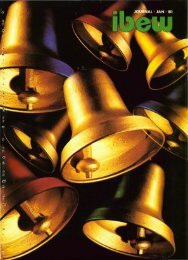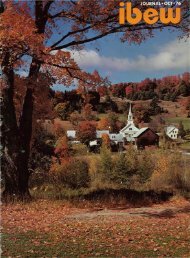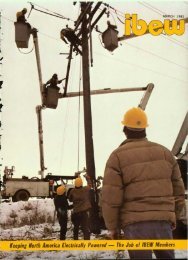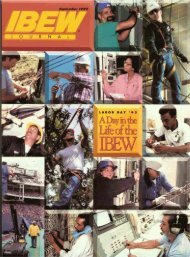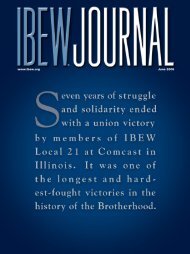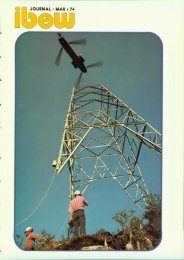t - International Brotherhood Of Electrical Workers
t - International Brotherhood Of Electrical Workers
t - International Brotherhood Of Electrical Workers
You also want an ePaper? Increase the reach of your titles
YUMPU automatically turns print PDFs into web optimized ePapers that Google loves.
Caw Teemw TECHNOLOGY<br />
SHORT time ago a conference representing<br />
teachers, statesiuta, religion,<br />
A labor, idutrialist, farnrs, layers,<br />
engineers, racial minorities and a<br />
variety of other groups, met as the Congress<br />
on Educathion for Democracy at<br />
Columbia University to discuss what<br />
they considered the supreme problem of<br />
our time, namely, 'How shall we educate<br />
for denocraly?"<br />
At first i..pression it may seem that<br />
the conference exaggerated the importance<br />
of its theme. But reflection or<br />
a study of the discussions will rveal that<br />
the topic is extremely comnprehensive.<br />
Education includes the cultivation of the<br />
means for realizing the ideals of society.<br />
In the Unliited States the ideals of society<br />
are the ideals of democracy, as noble<br />
as any yet conceived for the guidance<br />
of temporal affairs. There is room for<br />
questioning, however, whether the means<br />
employed are effiiently adapted to the<br />
realization of the democratic goal. An<br />
intelligent criticism of democratic means<br />
requires a re-examination of objectives.<br />
When the ultimate objectives of democ<br />
racy are considered, the great scope of<br />
the topic becomes apparent. As observed<br />
by a member of the conference, in tracing<br />
the origin of the idea of democracy.<br />
'"If we are bold enough and insistent<br />
enough our search will carry us into a<br />
considleratioe of all things human-the<br />
ultimate desig, of the universe."<br />
What is the real meaning of demnocracy,<br />
of freedom, of equality ? These are<br />
broad concepts subject to various and<br />
often opposing Interpretations. As noted<br />
by one of the speakers, the word democracy<br />
does not lppear in the Declaration<br />
of Independence; nor in the Constitution<br />
of the Uitead States. Another observed<br />
that it is easier to die for democracy<br />
than to define it. If democracy is to reach<br />
a greater perfection, indeed, if lemocracy<br />
is to survico, there must be a more<br />
widespread, realistic and precise understanding<br />
of its goals.<br />
The specific questions before the conferenee<br />
were not less significant. Can<br />
democratic government and the democratic<br />
way of life deal with the particlar<br />
issues arising out of immense machine<br />
technology, cities crowded with te,ming<br />
millions, private corporations exercising<br />
powers which were formerly not possessed<br />
even by sovereign states, the role of<br />
organized labor, industrialized farming<br />
and the decline of freehold agriculture,<br />
millions of unemployed and the demoralizing<br />
effects upon millions of others<br />
who cannot find signifiant work, an<br />
economy which is efficient in material<br />
and wasteful in human resources, and the<br />
q7ad& DEMOCRACY?<br />
Conference of<br />
leaders threads through maze<br />
of "isms" to seek an answer<br />
international rivalries which complicate<br />
all these issues?<br />
In emphasizing that time presses hard<br />
for a solution of these problems, the<br />
members of the conference were indulging<br />
in no professorial rhetoric. No more<br />
real or timely issues exist. Indicative<br />
of the nature of what is at stake, there<br />
is here cited an extract from a recent<br />
issue of Nation's Business, charateristic<br />
of some of the false solutions which are<br />
currently being urged. The article in<br />
advocating that federal relief should end,<br />
states:<br />
".-. almost every state constitution<br />
decrees that persons in poorhouses,<br />
prisons or insane hospitals<br />
shall not vote. It should be lational<br />
for courts to rule that there is no<br />
naterial difference between a pauper<br />
housed in a room rented with public<br />
funds and one housed in an institution,<br />
if some taxpayer just raised the<br />
question. If that fails, state lcislatures.<br />
not the federal government,<br />
define who shall vote. The power to<br />
eliminate paupers has always been<br />
recognized! The relief vote is dangerous<br />
only when it is allowed to<br />
vote,. Once amputated, it is harmless<br />
to retaliate.<br />
LIQUIDATE THE UNFORTUNATE<br />
The sanction here appealed to is power,<br />
not right. The use of the word retaliate<br />
is an adnission of the injustice of the<br />
proposal. The barbaric recommendation<br />
that palupers be ".liminated" would, if<br />
successful, eliminate human rights, liberty,<br />
equality and democracy itself. And<br />
yet, it is advocated within tile forms of<br />
democracy!<br />
Contrast that recommendation with<br />
Charles A. Beard's statement at the conference<br />
interpreting the declarations of<br />
the founders of the Arcricln Republic,<br />
"Ringing through their utterances like<br />
the tones of a clear bell is the warning<br />
thesis: A wide diffusion of property and<br />
a general equality of condition are the<br />
very foulndation stones of popular governin.<br />
[lt; a high concenltration of wealth<br />
is incompatible with uliversai sufflrge;<br />
a broad distribution of opport.unity and<br />
assurance to labor is necessary to the<br />
security of republican institutions,"<br />
It is noteworthy that many of the<br />
addresses made at the Congress for Eduaetti<br />
s t .tressed the importance and<br />
The Journal of ELECTRICAL WORKERS and Operators<br />
immediacy of the threat which the continued<br />
unhealthy state of our economy<br />
holds for democracy. But when the particular<br />
functions of the schools were<br />
under consideration, the fear of permitting<br />
teachers to include "controversial"<br />
issues among their subjects was repeatedly<br />
vxpre.sed. Since the actual condition<br />
of our ecollomy, and the causes and the<br />
effects thereof constitute the most controv.rsial<br />
issue of the dlay it seems, in<br />
the writers opinion, that the dilemma<br />
which tile educational conference rfleeted<br />
typifies the dilemma with which democracy<br />
is confronted. Avoidance of such<br />
is.ues not only delays solution. but leaves<br />
the way open for action based upon ignorance<br />
and the frequently deceiving<br />
propaganda of partisans.<br />
This difficulty ws reflected in anothr<br />
form in the discussion entitled '"Centera<br />
of Tension in Education for Democracy.<br />
As summarized by Frank P. Graham,<br />
president of the University of North<br />
Carolina, the most conspicuous source<br />
of tension arises over the scope and cost<br />
of the schools. Because of the depleted<br />
condition of public treasuries, itself a<br />
condition resulting from a faulty funec<br />
tioning of our economy, there is a growing<br />
pressure to lighten the burden at<br />
the expense of education. It seems that<br />
President Grahanm's treatment of the matter<br />
was significant. After pointing out<br />
that, in spite of the great sum spent on<br />
education, it is still less than is spent<br />
for past and future walrs, he said, "The<br />
suggestion that we save out of the school<br />
budgets to pay olff the large state debts<br />
leaves out of acCounlt the fact that we<br />
will pay off our long ilunhin debt only<br />
by the Ion-run educational development<br />
of the latent capacities and creative power<br />
oi the people."<br />
While the struggl of democracy is<br />
usually, and properly . associated with<br />
(Continued on nge 108)


